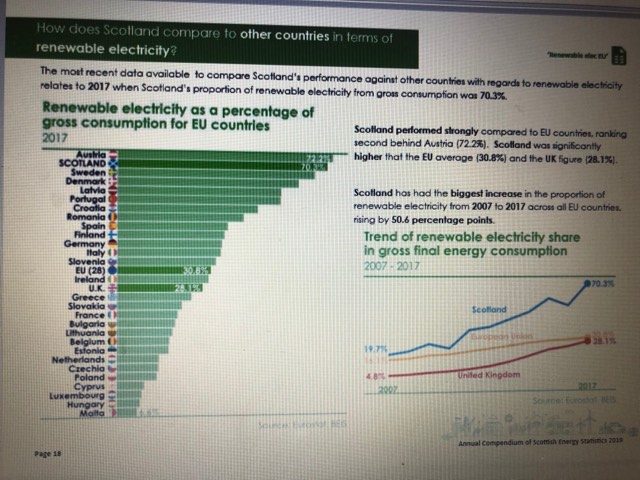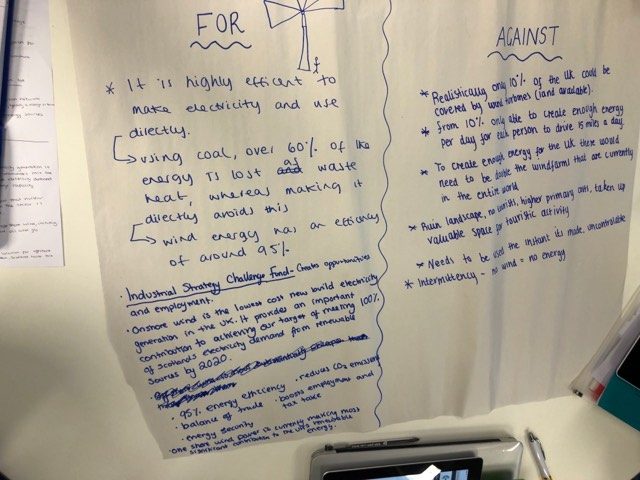Energy is a topic that is being heavily debated right now especially amongst world leaders. In recent years people have gained an awareness of the inevitable end of fossil fuels with most people realising the importance of using renewable energy. Although there is infinite evidence for the extinction of coal, oil and gas some people are still in denial that they will run out.
Within the last two hundred years the fossil fuel intake has majorly increased causing irreversible damage to supply and the environment, especially in respects to climate change. Around 90% of carbon emissions is due to fossil fuel human activity this emission is having effects on issues like pollution which has majorly increased in the air and ocean Ecotricity, (2019).
In the lecture we discussed that this subject could possibly scare children so as teachers we must also always remember to ensure children not to worry because Scotland is one of the most environmentally forward countries in the whole world.

However, teaching this subject to children is still incredibly important as they must understand the severe damage that society has caused to natural resources. Curriculum for Excellence, (2006) highlights the importance of teachers developing responsible citizens. Teaching a subject like energy allows teachers to inform children about their significant responsibility to promote a greener world which can be done by using alternative energy sources. As teachers we must encourage children to realise that these issues affect their present and future which is why they should take a stance in fighting for a greener tomorrow. However, in order to encourage this, we must first educate children by creating experiences that allow them to develop a sense of duty. Teachers should also encourage children to think local and act global. A good way to promote this to the full school is through the eco hooks award. This allows children to gain an insight into how their small decisions can have negative and positive impacts on the world, for example a negative small decision to drop litter is adding to a huge environmental problem.
The first input and lecture gave me a good insight into how I can teach children about energy. The lecture inspired me to introduce the topic to children they can make a list of all the things that they do everyday that requires energy like taking a shower, walking/driving to school and brushing their teeth this can help them to realise that energy surrounds us and is vital to everyday life. The first input also gave me some simple ways that I can teach children about energy through science. Curriculum for Excellence, (2006) highlights that learning through science allows children to investigate their environment, realise the influence that science has on their own lives and others as well as its impact on the environment. It also highlights that science allows children to gain skills like enquiry, investigative and analytical thinking. This car activity shows simply to children how new energy sources like light act as a force of power to move things.
In the second input we had a debate about wind farms. We began by researching the set articles independently and writing points for both advantages and disadvantages then presented our findings in groups of four. We were then put in larger groups to repeat this process then finally we were given our side of the argument and had to combine all our information to make our five strongest arguments.

Education Scotland (2019) has an exemplar of a debate that took place in Douglas Academy with viewpoints from teachers and students. In the exemplar one student speaks about the benefits the debate experience has had on them like gaining transferable skills such as analysing, structuring and confidence. Across the teaching staff they highlighted that it is helping the students to develop their confidence, sensibility, organising and political literacy skills as well as gain an awareness around global issues. For me as a student I felt that this learning experience was very successful for me as not only did I have to find my own information, but I also learned a great deal from my peers which for me is a bit easier and I take more in. From researching about debating in schools and experiencing it from a learner’s perspective I now know the pedagogical benefits that this method of learning has on children and their skills. Which is why I will be using it in the classroom especially when teaching about controversial global issues. Reflecting to the micro-teaching experience where I used the Kolb (1984) Experimental Learning Cycle I identified that I wanted to improve my public speaking skills so I set a goal to practise public speaking whenever I could. This experience has allowed me to do this in small to large groups. Reflecting on this experience and asking my peers if they thought I had improved we all agreed that I was more relaxed and clear this time.
In the second week the cohort was split into two groups and put into separate rooms where each section was both asked to make a car but with different approaches:
Structural

Tinkering

The structural group were given instructions whereas the tinkering group were just asked to use their creative thinking with the materials set out. When we came together as a cohort, we discussed some of the benefits and costs that each method had. The structural side agreed that they felt relaxed and as future teachers this approach allows you to know the resources required. However, we agreed that with this approach you need to be precise meaning no room creativity. The tinkering side agreed that we had a great sense of accomplishment as we made our idea come to life however it was stressful, and from a teacher’s perspective it is complicated to facilitate. The GTC standards (2019) highlights the importance of having good working relationships with your peers/colleagues. The tinkering approach allowed me to work collaboratively with new people and build new relationships.
Curriculum for Excellence. (2006) Building the Curriculum 1 Available: https://education.gov.scot/Documents/btc1.pdf [Accessed: 20 November 2019]
Ecotricity. (2019) When will fossil fuels run out? [Online] Available: https://www.ecotricity.co.uk/our-green-energy/energy-independence/the-end-of-fossil-fuels [Accessed: 20 November 2019].
Education Scotland. (2019) Douglas Academy – Debating and public speaking. Available: https://education.gov.scot/improvement/practice-exemplars/douglas-academy-debating-and-public-speaking [Accessed: 20 November 2019]
General Teaching Council for Scotland. (2019) Overview of the Standards. Available: https://www.gtcs.org.uk/professional-standards/engaging-with-the-standards/overview-of-the-standards.aspx [Accessed: 20 November 2019]
Kolb, D. (1984) Experiential Learning: Experience as the Source of learning and Development. New jersey: Prentice-Hall.
Matthews, P. Scherr, I. (2019) Annual Compendium of Scottish Energy Statistics Available: https://www.gov.scot/binaries/content/documents/govscot/publications/publication/2019/05/energy-consumer-action-plan-putting-consumers-heart-scotlands-energy-transition/documents/annual-compendium-scottish-energy-statistics/annual-compendium-scottish-energy-statistics/govscot%3Adocument/annual-compendium-scottish-energy-statistics.pdf [Accessed: 20 November 2019]

